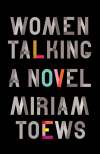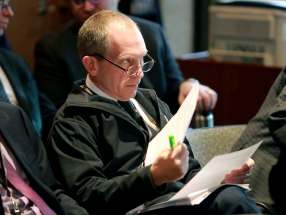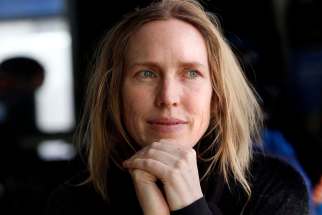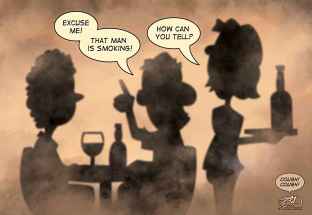Something to talk about Miriam Toews muses on Mennonites, home, her tough new novel and life as a grandmother
Read this article for free:
or
Already have an account? Log in here »
To continue reading, please subscribe:
Monthly Digital Subscription
$0 for the first 4 weeks*
- Enjoy unlimited reading on winnipegfreepress.com
- Read the E-Edition, our digital replica newspaper
- Access News Break, our award-winning app
- Play interactive puzzles
*No charge for 4 weeks then price increases to the regular rate of $19.00 plus GST every four weeks. Offer available to new and qualified returning subscribers only. Cancel any time.
Monthly Digital Subscription
$4.75/week*
- Enjoy unlimited reading on winnipegfreepress.com
- Read the E-Edition, our digital replica newspaper
- Access News Break, our award-winning app
- Play interactive puzzles
*Billed as $19 plus GST every four weeks. Cancel any time.
To continue reading, please subscribe:
Add Free Press access to your Brandon Sun subscription for only an additional
$1 for the first 4 weeks*
*Your next subscription payment will increase by $1.00 and you will be charged $16.99 plus GST for four weeks. After four weeks, your payment will increase to $23.99 plus GST every four weeks.
Read unlimited articles for free today:
or
Already have an account? Log in here »
Hey there, time traveller!
This article was published 17/08/2018 (2673 days ago), so information in it may no longer be current.
Over the course of her writing career, former Manitoba writer Miriam Toews has carved out a career for herself that has garnered widespread critical acclaim and an adoring fan base, while still managing to ruffle some feathers along the way.
Her 2004 Governor General’s Award-winning novel A Complicated Kindness placed Toews squarely in the national literary spotlight, where she’s enjoyed consistent success for both her fiction and non-fiction ever since, including for her 2014 novel, All My Puny Sorrows.
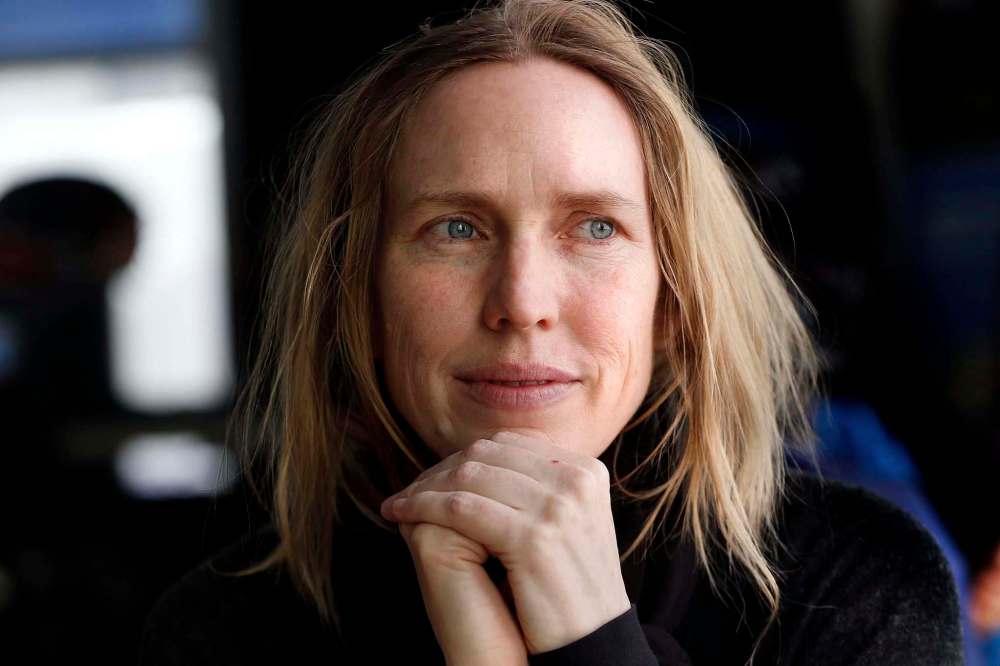
Now based in Toronto, Toews has never shied away from tackling tough issues such as mental illness, suicide and what she finds to be the more troublesome aspects of Mennonite culture. (She was born and raised in Steinbach before moving to Winnipeg and then Toronto.)
Toews’ new novel Women Talking is a fictional dialogue between eight women living in the ultra-conservative Molotschna Mennonite colony in South America. For years, the women of the colony thought they were being raped by ghosts or Satan as punishment for their sins; in fact, it was men of the colony drugging the women with animal tranquilizer and raping them. With the responsible men taken to the city by police and the rest of the men away to post their bail, the eight women — four Friesens and four Loewens — meet in a loft over the course of 48 hours to figure out whether they should do nothing, stay and fight or flee.
Told through the trancripts of August Epp, tasked with recording the meetings on paper, Women Talking is a fictional account of real events that took place in the Manitoba colony in Bolivia between 2005 and 2009. As an author’s note at the book’s outset states that the real-life perpetrators were convicted in 2011 and sent to prison, although similar sexual abuse has been reported in the colony as recently as 2013.
The Free Press spoke with Toews by phone before the launch Women Talking in Winnipeg on Thursday, where she’ll be joined in conversation by local singer/songwriter Christine Fellows. The following interview has been edited for length and clarity.
Talk a bit about the origins of Women Talking.
There were rumours about these attacks in the Mennonite community going way back. The attacks are said to have occurred between 2005 and 2009. When I heard about the story through the Mennonite grapevine — just shadowy, blurry, vague details — I thought maybe this was something I would want to explore in my writing.
But then my sister [Marjorie] got very sick, and she died in 2010. And so at that point I stopped doing everything. I thought that I wasn’t going to write, period. And then of course time passed and I wanted to write again, but I wanted to write about my sister [the result being the 2014 novel All My Puny Sorrows]. So the colony story was put to the side, which I returned to later and finished in 2016.
The book is an imagined response to the events. This is a closed colony; certainly somebody like myself would not be allowed in to speak to the women. They are virtual prisoners in these ultra-conservative colonies, which the Manitoba colony — the real colony in Bolivia where these attacks occurred — is.
The real events that inspired my fiction are more unbelievable, horrifying and bizarre than the fiction, as is so often the case.
The dialogue between the eight women is told told through transcripts written by a man about the decision they need to make: do nothing, stay and fight, or flee. How did you come to the decision to take that approach narratively?
I thought for some time about how to enter the story. The whole process of writing this book was such an intense experience for me, an explosion in my head. I knew that for these women to be authentic, to be believable, they would have to be essentially speaking in their own language within the context of their own colony, their community, their faith, their experience in the world.
In order for it to be in English, for me to write it in English, I’d have to create a translator. And for someone to translate the Low German, the Plautdietsch — which is an unwritten language, and the only language these women speak — I needed somebody who had spent time outside the colony, which meant it would necessarily be a man. For my purposes it made more sense that it was a man who had been exposed to the world, and who had learned how to read and write, and had some world experience, and was able to translate from the Plautdietsch to English.
Your books often seem to be met with a fair bit of controversy from some corners of the Mennonite community — do you anticipate this book will be met with the same reaction?
I don’t know how people will react. From my past experience there have been people within the Mennonite community who are upset with what I write, who would prefer that these types of occurrences aren’t made public, who feel all I’m doing is showing the negative aspect of the Mennonite community. And yet I receive incredible support from Mennonites as well — not only secular Mennonites like myself or even disenfranchised Mennonites, but even devout church-going Mennonites. These are harsh things, difficult things, horrific acts that have happened in the Mennonite community. And we need to see how they happened, and why, and how we can stop them from happening.
And, of course, I would say they happen because of the authoritarian, patriarchal fundamentalist culture of control that exists, especially in these conservative communities and colonies. Women are second-class citizens, often of less value to the men than the animals. They are virtual prisoners. In different ways I’ve been addressing these themes throughout my writing career.
But I go to great lengths to say it’s not the Mennonite faith or the Mennonite people I’m critical of. The people I love most in this world are Mennonites, and for the most part are devout, religious Mennonites. It’s that idea of fundamentalism, of scripture being used to oppress girls and women: women, submit to your husbands and children, submit to your fathers. And when you take that literally and you apply it, and you are giving that kind of leeway and entitlement to certain types of individuals within these communities — and these communities are closed, and remote, and isolated — all sorts of horrible things can happen. The crimes that happened in Bolivia are an extreme example of this.
I identify as a Mennonite — these are my people. I could write books about all the beautiful parts of what it is to be a Mennonite: the history, tradition, the tenets of the faith, the pacifism and so on until I’m blue in the face. But it’s the job I’ve undertaken, a mission, to expose some of the hypocrisy, the negative aspects of the culture so that we can change, can improve, can protect and even educate ourselves and become better.
Are you doing a fair bit of touring behind this book?
I am and I’m not. Here’s the thing that happened in my life in the last year: I’ve become a grandmother, twice. It’s amazing. My son Owen and his partner Bronwyn had a little daughter, Sylvia, who is nine months old. And my daughter and her partner had a son named Austin — he’ll be three weeks old tomorrow. She’s here in Toronto. So I need to and want to be around as much as I can, but I do have to travel a bit with the book.
I should mention my son Owen [Toews] lives in Winnipeg and has a book coming out called Stolen City: Racial Capitalism and the Making of Winnipeg, which is being published by Arbeiter Ring. That’s me wearing my mother hat, giving him a plug (laughing). It’s so hard to get going in that world.
But I wasn’t going to have a launch for this book. The idea of “celebrating” a book like this isn’t quite the right word. The book is inspired by events that we’re not celebrating. Having said that, it will give me an opportunity to thank some people.
Are the Winnipeg events different for you in any way than those in other places?
I always get emotional around coming back to Winnipeg. In my mind I like to imagine Toronto and Winnipeg as one big city with a vast park between them. In Toronto it takes two hours to get anywhere, and it takes two hours to get to Winnipeg by plane, so I just like to think of it as one city. I just live in the far eastern suburb of Winnipeg — that’s better for me psychologically.
But Winnipeg events certainly bring a different demographic. The support I have from people — my old best friends, my family I have there, and the Mennonite community there, which is so strong and supportive… well, for the most part (laughing) — it’s always an incredibly emotional experience for me to go back to Winnipeg. Not even for launching a book necessarily, but for any reason.
I’ll be back in Winnipeg in September, and October, and November. I’ll be in Winnipeg for Owen’s launch [on Sept. 13 at 7 p.m. at the Millennium Library]. I think he’s a beautiful writer. He’s a very modest guy; he’ll probably just hate the fact I that was talking about him. (laughing)
As always, I’m really excited about coming to Winnipeg for a variety of reasons, and I’m especially excited Christine Fellows is doing this launch with me.
Are you currently working on any writing projects right now?
No, I had started something… you know, this happens to me virtually all the time. I started something, wrote 100 pages and thought “yeah, this is good.” And then I realized it’s not good — although maybe there’ll be something I can salvage from it. There’s this cliché of the unpublished novel in the drawer for a lot of writers. In this case I just plain shit-canned it.
books@freepress.mb.ca
Preview
An Evening with Miriam Toews
Launching the novel Women Talking, in conversation with Christine Fellows
● Thursday, 7 p.m., McNally Robinson Booksellers Grant Park location
History
Updated on Thursday, August 23, 2018 4:56 PM CDT: corrects spelling of dialogue

